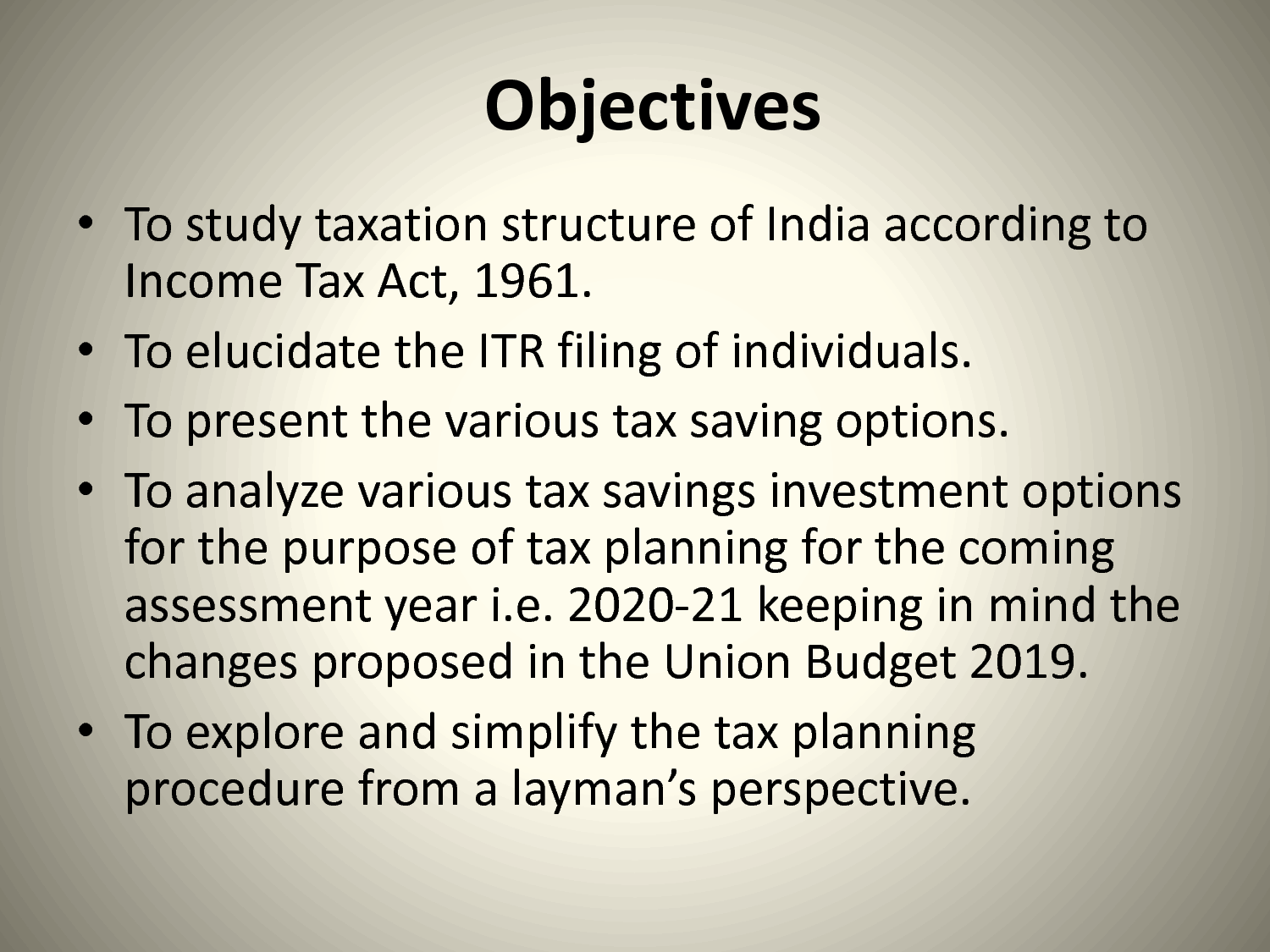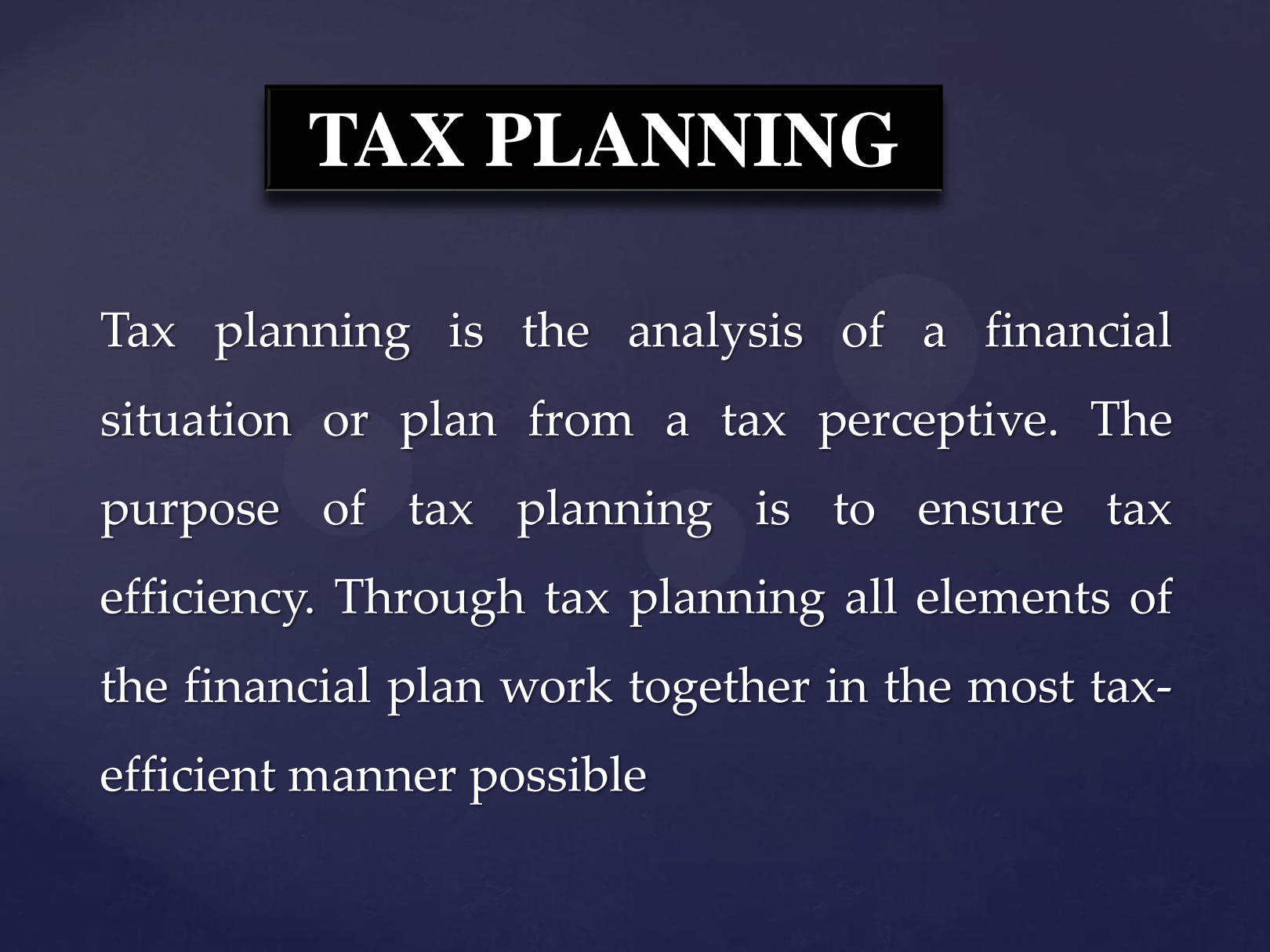

Finance
What Kind Of Professional Does Tax Planning?
Published: January 21, 2024
Looking for professional tax planning services? Finance experts specialize in tax planning to help you minimize your tax liabilities and maximize your financial strategies.
(Many of the links in this article redirect to a specific reviewed product. Your purchase of these products through affiliate links helps to generate commission for LiveWell, at no extra cost. Learn more)
Table of Contents
Introduction
Tax planning is an essential aspect of managing one’s finances effectively. It involves strategizing and optimizing one’s income, investments, and expenses to minimize the amount of taxes owed to the government. However, tax laws and regulations can be complex and ever-changing, making it challenging for individuals to navigate on their own. This is where the expertise of a tax planner comes into play.
A tax planner is a professional who specializes in providing guidance and assistance to individuals and businesses in managing their tax liabilities. They possess in-depth knowledge of tax laws, regulations, and loopholes, and use this knowledge to develop personalized strategies that can help their clients minimize their tax burden legally and ethically.
Whether you are an individual looking to optimize your personal tax situation or a business owner seeking to maximize your tax savings, a tax planner can be an invaluable resource. They can help you identify deductions, credits, and exemptions that you may not be aware of, and create a comprehensive tax plan tailored to your specific needs and goals.
When it comes to tax planning, it is crucial to work with a qualified and experienced professional who possesses the necessary skills and expertise. In the following sections, we will explore the role of a tax planner and the different types of professionals who specialize in tax planning.
Role of a Tax Planner
A tax planner plays a crucial role in helping individuals and businesses effectively manage their tax liabilities. Their primary goal is to minimize the amount of tax owed by their clients through strategic planning and optimization. Here are some key responsibilities that a tax planner fulfills:
- Tax Analysis: A tax planner conducts a comprehensive analysis of their clients’ financial situation, including income, expenses, investments, and assets. They evaluate the current tax implications and identify opportunities for tax optimization.
- Tax Planning and Strategy: Based on the analysis, a tax planner develops personalized tax planning strategies that align with their clients’ financial goals. They take into account various factors such as income sources, deductions, credits, and tax-efficient investments to maximize tax savings.
- Tax Compliance: A tax planner ensures that their clients comply with all applicable tax laws and regulations. They keep track of important deadlines, documentation requirements, and changes in tax legislation to avoid penalties and ensure accurate filing.
- Tax Return Preparation: A tax planner prepares and files tax returns on behalf of their clients. They utilize their tax expertise and advanced software to accurately report income, deductions, credits, and any other relevant information to minimize tax liability.
- Audit Support: In the event of a tax audit or examination by tax authorities, a tax planner provides support and representation to their clients. They help gather the necessary documentation, negotiate with tax authorities, and ensure their clients’ rights are protected throughout the audit process.
Overall, a tax planner acts as a trusted advisor, guiding their clients through the complexities of the tax system and helping them make informed decisions that have a significant impact on their financial well-being.
Skills and Expertise Required
Being a tax planner requires a combination of technical knowledge, analytical skills, and a deep understanding of tax laws and regulations. Here are some essential skills and expertise required to excel in the field:
- Tax Knowledge: A tax planner must have a comprehensive understanding of tax laws and regulations. They should stay up-to-date with the latest developments, changes in tax codes, and new legislation to provide accurate and up-to-date advice.
- Analytical Skills: Effective tax planning involves analyzing complex financial data and identifying opportunities for tax optimization. A tax planner should have strong analytical skills to interpret financial statements, assess tax implications, and develop strategic tax-saving strategies.
- Problem-Solving Abilities: Tax planning often presents complex scenarios and challenges. A tax planner must possess excellent problem-solving abilities to navigate through intricate tax structures and find innovative solutions that minimize taxes within the legal framework.
- Attention to Detail: Tax planning requires meticulous attention to detail to ensure accurate reporting and compliance. Even the smallest error in tax calculations or documentation can have significant implications. A tax planner should have an eye for detail to avoid mistakes and maximize tax savings.
- Communication Skills: Effective communication is vital for a tax planner to understand their clients’ financial goals and convey complex tax concepts in a clear and understandable manner. They should be able to build strong relationships with clients, explain tax strategies, and address any concerns or questions.
- Ethical Conduct: Tax planning must be conducted within the boundaries of the law and ethical guidelines. A tax planner must demonstrate integrity, honesty, and a commitment to compliance to ensure that clients receive accurate and trustworthy advice.
Additionally, staying informed about industry trends, networking with other tax professionals, and continuing professional education are essential for tax planners to maintain their expertise and deliver the highest quality of service to their clients.
Types of Professionals in Tax Planning
There are several types of professionals who specialize in tax planning, each with their own unique expertise and qualifications. Depending on your specific needs and circumstances, you may choose to work with one or a combination of these professionals:
- Certified Public Accountants (CPAs): CPAs are licensed professionals who have a strong understanding of accounting principles and tax regulations. They can provide comprehensive tax planning and preparation services, as well as offer advice on financial management and business planning. CPAs undergo rigorous education, examination, and experience requirements to obtain their certification.
- Enrolled Agents (EAs): EAs are tax professionals authorized by the Internal Revenue Service (IRS) to represent taxpayers in tax matters. They have specialized knowledge in tax laws and undergo a comprehensive exam administered by the IRS. EAs can assist with tax planning, preparation, and representation before tax authorities.
- Tax Attorneys: Tax attorneys are legal professionals who specialize in tax law. They have extensive knowledge of tax regulations and can provide guidance on complex tax matters. Tax attorneys can help with tax planning, resolving tax disputes, and navigating tax-related legal issues.
- Financial Planners: Financial planners offer comprehensive financial advice and planning services, including tax planning. They take a holistic approach to managing their clients’ finances and consider various factors such as investments, retirement planning, and tax implications. Financial planners may hold certifications such as Certified Financial Planner (CFP) or Chartered Financial Analyst (CFA).
It’s important to note that the specific services offered by these professionals may vary. Some may focus solely on tax planning, while others provide a broader range of financial services. When choosing a professional for tax planning, consider their qualifications, experience, and expertise in your specific tax situation.
Additionally, consulting with a team of professionals, such as a CPA, tax attorney, and financial planner, can provide a comprehensive and well-rounded approach to tax planning, ensuring all aspects of your financial situation are considered and optimized.
Certified Public Accountants (CPAs)
Certified Public Accountants (CPAs) are professionals who have obtained the necessary qualifications and certifications to provide a wide range of accounting and financial services, including tax planning. They play a crucial role in helping individuals and businesses navigate the complex world of taxes. Here’s what you need to know about CPAs and their expertise in tax planning:
Educational and Certification Requirements: To become a CPA, individuals must meet strict educational requirements, which typically include completing a bachelor’s degree in accounting or a related field. Additionally, they must pass the Uniform Certified Public Accountant Examination and fulfill specific experience requirements. CPAs are also required to meet ongoing continuing education requirements to stay updated with the latest changes in tax laws and regulations.
Tax Knowledge and Expertise: CPAs have in-depth knowledge of tax laws and regulations, allowing them to provide comprehensive tax planning services. They stay informed about changes in tax codes, case law, and IRS rulings to ensure accurate and up-to-date tax advice. With their expertise, CPAs can help individuals and businesses identify tax-saving opportunities and develop effective strategies to minimize tax liabilities.
Assistance with Tax Preparation: In addition to tax planning, CPAs also offer tax preparation services. They have the knowledge and experience to accurately prepare tax returns, ensuring all eligible deductions, credits, and exemptions are claimed. CPAs use specialized accounting software to streamline the process and maximize accuracy.
Financial Management Expertise: CPAs understand the broader financial picture and can offer valuable insights beyond tax matters. They can provide advice on financial management, budgeting, and cash flow analysis. This holistic approach allows CPAs to develop strategies that not only optimize tax outcomes but also contribute to overall financial success.
Audits and Representation: If you face an IRS audit or need assistance in resolving tax disputes, CPAs can provide valuable support. They can represent you before the IRS, helping you gather the necessary documentation, navigate the audit process, and negotiate on your behalf. Their expertise can be particularly beneficial in minimizing potential penalties and ensuring your rights are protected.
When looking for a CPA for tax planning, consider their experience, reputation, and areas of specialization. Some CPAs may have expertise in specific industries or tax niches, making them particularly adept at handling certain tax situations. It is also important to establish a strong working relationship with your CPA, as they will be assisting you with various financial matters throughout the year.
In summary, CPAs bring a wealth of tax knowledge and expertise to the table, making them valuable partners in tax planning. Their comprehensive understanding of tax laws and their ability to provide strategic advice can help individuals and businesses optimize their tax position and achieve their financial goals.
Enrolled Agents (EAs)
Enrolled Agents (EAs) are tax professionals authorized by the Internal Revenue Service (IRS) to represent taxpayers in tax matters. They play a significant role in tax planning, preparation, and representation. Here’s what you need to know about EAs and their expertise in tax planning:
IRS Authorization: EAs have obtained a special enrollment with the IRS, allowing them to represent taxpayers before all administrative levels of the IRS, including audits, appeals, and collections. This authorization demonstrates their in-depth knowledge of tax laws and regulations.
Specialized Tax Knowledge: EAs possess extensive knowledge in all areas of taxation, including individual, business, estate, and trust taxes. They stay up-to-date with the latest changes in tax laws, regulations, and court cases to provide accurate and relevant advice in tax planning.
Tax Planning and Strategy: EAs are skilled in developing effective tax planning strategies to minimize tax liabilities. They take into account various factors, such as income sources, deductions, credits, and tax-efficient investments, to optimize tax outcomes for their clients. EAs can provide guidance on strategies like timing income and expenses, maximizing deductions, and utilizing tax credits.
Tax Return Preparation: EAs are proficient in preparing accurate and compliant tax returns. They utilize their tax expertise to identify applicable tax deductions, credits, and exemptions to reduce tax liability. EAs can assist with both individual and business tax returns, ensuring that all necessary forms and schedules are completed correctly.
Representation and Tax Controversies: In the event of a tax audit or dispute with the IRS, EAs can represent taxpayers. They have the expertise to address inquiries from tax authorities, communicate on behalf of their clients, and navigate the audit process. EAs can protect and advocate for their clients’ interests, ensuring fair treatment and minimizing potential penalties.
Continuing Education: EAs are required to maintain their professional standing by completing continuing education courses focused on tax law and ethics. This ensures that they stay current with evolving tax regulations and maintain their expertise in tax planning and preparation.
When considering working with an EA, it is essential to verify their credentials with the IRS to ensure they are authorized to represent taxpayers. Additionally, it is helpful to inquire about their experience and areas of specialization. Some EAs may have expertise in specific tax niches, such as small business taxes or international taxation.
In summary, EAs are knowledgeable professionals who specialize in tax planning, preparation, and representation. Their authorization by the IRS and specialized tax expertise make them valuable partners in navigating the complexities of the tax system and maximizing tax savings for individuals and businesses.
Tax Attorneys
Tax attorneys are legal professionals who specialize in tax law. They possess in-depth knowledge of complex tax regulations and provide expert advice on tax planning and compliance. Here’s what you need to know about tax attorneys and their expertise in tax planning:
Expertise in Tax Law: Tax attorneys have extensive knowledge of tax laws, including federal, state, and local tax regulations. They stay updated with changes in tax codes, IRS rulings, and judicial decisions that impact tax planning strategies.
Complex Tax Planning Strategies: Tax attorneys can develop sophisticated tax planning strategies tailored to their clients’ unique situations. They analyze the legal and financial aspects of their clients’ circumstances to identify opportunities for tax optimization. Tax attorneys can provide guidance on complex tax matters such as estate planning, business reorganizations, international tax issues, and investments.
Legal Representation: Tax attorneys can represent individuals and businesses in tax controversies, audits, and disputes with tax authorities. They have the expertise to navigate through the legal complexities of the tax system and protect their clients’ rights. Tax attorneys can negotiate settlements, provide legal advice in IRS discussions, and represent clients in tax litigation if necessary.
Legal Compliance and Risk Mitigation: Tax attorneys ensure their clients comply with tax laws and regulations to avoid penalties and potential legal issues. They review tax filings, contracts, and business transactions to identify any potential tax risks and advise clients on mitigation strategies.
Collaboration with Accountants and Financial Professionals: Tax attorneys often work alongside accountants and financial professionals to provide comprehensive tax planning solutions. They can collaborate with CPAs, enrolled agents, and financial planners to develop strategies that align with clients’ overall financial goals and objectives.
Tax Law Advocacy: Tax attorneys may also be involved in advocating for changes in tax policy and legislation. They can provide expert insights and analysis to legislators and policymakers, contributing to the development of more effective and equitable tax systems.
When seeking the assistance of a tax attorney, it is crucial to consider their qualifications, experience, and areas of specialization. Some tax attorneys may focus on specific industries or tax niches, while others have expertise in broader tax matters. Working with a tax attorney can provide valuable legal insights and ensure compliance with tax laws while optimizing tax strategies.
In summary, tax attorneys are legal professionals with specialized knowledge in tax law. Their expertise in tax planning, compliance, and legal representation makes them valuable partners in managing complex tax matters and navigating the intricacies of the tax system.
Financial Planners
Financial planners are professionals who offer comprehensive financial advice and planning services. While their primary focus is on overall financial management, they also play a crucial role in tax planning. Here’s what you need to know about financial planners and their expertise in tax planning:
Integrated Approach to Financial Planning: Financial planners take a holistic approach to managing their clients’ finances. They consider various aspects such as investments, retirement planning, insurance, and tax implications when developing a comprehensive financial plan that aligns with their clients’ goals.
Tax Optimization Strategies: Financial planners are knowledgeable about tax laws and regulations and can provide guidance on tax optimization strategies. They help clients identify potential tax deductions, credits, and exemptions, ensuring that their investments and financial decisions are tax-efficient.
Coordination with Tax Professionals: Financial planners often collaborate with tax professionals such as CPAs and enrolled agents to ensure tax planning strategies align with clients’ overall financial goals. They work closely with tax experts to integrate tax planning into broader financial planning strategies.
Retirement Planning and Tax Efficiency: Financial planners assist clients in developing retirement plans that include tax-efficient strategies. They consider factors such as retirement account contributions, required minimum distributions, and Social Security benefits to optimize tax savings during retirement years.
Estate Planning and Tax Implications: Financial planners help clients navigate estate planning and ensure that tax implications are considered. They work with estate planning attorneys and tax professionals to minimize potential estate taxes and ensure a smooth transfer of wealth to beneficiaries.
Education and Goal Setting: Financial planners educate clients about tax laws and their impact on financial planning decisions. They help clients set realistic goals and create strategies to achieve them while maximizing tax advantages.
Investment Strategies and Tax Consequences: Financial planners consider the tax consequences of different investment vehicles and investment strategies. They recommend tax-efficient investment options and asset allocation strategies that align with clients’ risk tolerance and financial objectives.
When choosing a financial planner, it’s important to consider their qualifications, experience, and certifications such as Certified Financial Planner (CFP) or Chartered Financial Analyst (CFA). Additionally, a strong working relationship and open communication with your financial planner are essential for effective tax planning and overall financial success.
In summary, financial planners provide comprehensive financial advice and play a vital role in tax planning. Their expertise in integrating tax considerations into broader financial planning strategies can help clients optimize their financial goals and minimize tax liabilities.
Conclusion
Tax planning is a critical aspect of managing one’s finances effectively, and it requires a deep understanding of tax laws and regulations. Working with a qualified professional can help individuals and businesses navigate the complexities of the tax system and maximize tax savings.
In this article, we explored the different types of professionals who specialize in tax planning. Certified Public Accountants (CPAs) bring a wealth of tax knowledge and expertise, helping clients with tax analysis, planning, compliance, and representation. Enrolled Agents (EAs) are authorized by the IRS and possess specialized tax knowledge, offering services such as tax planning, preparation, and representation. Tax attorneys are legal professionals who excel in complex tax matters, providing expert guidance on tax planning, compliance, and representation during audits or disputes. Financial planners approach tax planning as part of a comprehensive financial strategy, considering tax optimization strategies alongside investment, retirement, and estate planning.
Each of these professionals has a unique skill set and expertise, allowing them to provide valuable insights and strategies to minimize tax liabilities. The choice of professional depends on individual needs, preferences, and the complexity of the tax situation.
In conclusion, tax planning requires careful consideration, analysis, and expertise. Seeking the assistance of a qualified professional can make a significant difference in optimizing tax outcomes and achieving financial goals. By working with a tax planner, individuals and businesses can navigate the complexities of tax laws, ensure compliance, and make informed decisions that positively impact their financial well-being.














